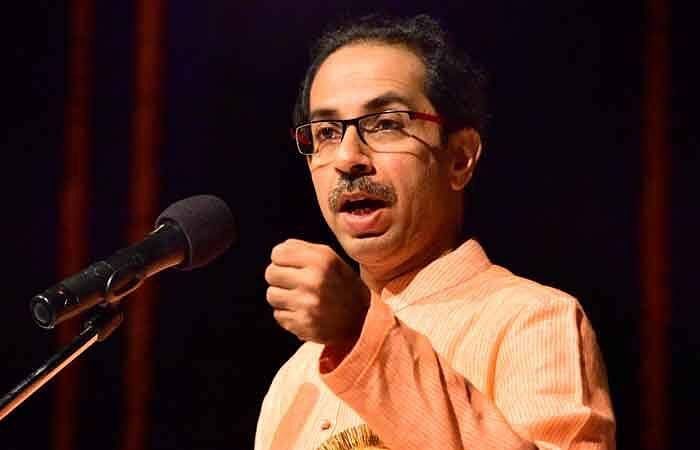The saffron alliance will not break anytime soon.
Whether Lord Ram can rescue the Bharatiya Janata Party from its current predicament will be known when the results of the assembly elections are announced on 11 December. But Ram is definitely helping Shiv Sena’s Uddhav Thackeray. At least, for the time being.
Uddhav stole the show in Ayodhya from the Vishva Hindu Parishad (VHP), the Rashtriya Swayamsevak Sangh (RSS) and the Bharatiya Janata Party (BJP). Perhaps, even he did not imagine that he would get such a grand welcome from the sants and mahants as well as the thousands of people who had gathered in the holy city. Uddhav Thackeray used the occasion to target NOT the “secularist” Congress or Rahul Gandhi, but Prime Minister Narendra Modi.
He challenged the Modi government to show the guts to build Ram Mandir as promised in the BJP manifesto. The Sena chief said that if the government could decide on demonetisation without waiting for a court order, then “why can’t a decision be taken for construction of the mandir?”
“It is the desire of all the Hindus in India to see the glorious Ram Mandir built in Ayodhya”, he thundered.
The coup theory
“Thundering” is not Uddhav Thackeray’s style of delivering speeches. That is the forte of Raj Thackeray, his cousin. But in Lord Ram, Uddhav has now found a new role for the Shiv Sena. Until a few months ago, Uddhav was confronting his alliance partner, the BJP, on the issues of farmers’ distress, farm loan waiver, inability to check rising petrol and diesel prices, economic failure and unemployment.
Ironically, Uddhav was the voice of the opposition, but from within the government. Indeed, the Congress and the Nationalist Congress Party (NCP) were not as eloquent as the Shiv Sena. Sanjay Raut, the outspoken editor of the Shiv Sena mouthpiece Saamana, went a step further by appreciating the rise of Rahul Gandhi and condemning Modi. This prompted political commentators to conclude that the saffron alliance would break.
The political fantasy in the media as well as in the Congress-NCP circles was that Uddhav would become the chief minister of Maharashtra with their support. There were the “coup theorists” who had worked out the arithmetic. The BJP has 122 seats while the Sena-NCP-Congress has over 140 seats. More could be brought under this new formation, they would say.
Also read: Can the Shiv Sena be in the opposition and government at the same time?
NCP chief Sharad Pawar would also drop similar ‘hints’. There were speculations about “secret meetings” between Pawar and Raut and between Congress’ Ashok Chavan and Uddhav Thackeray.
Either Uddhav Thackeray had not thought of his Ayodhya campaign at that time or did not think that he could use “Ram Mandir” to embarrass the government or the Sangh Parivar. Moreover, how could the Shiv Sena, which has extensively campaigned against the ‘outsiders’ from Bihar and Uttar Pradesh, go to UP and seek support for its political campaign?
Consolidating Sena
But all these arguments have fallen by the wayside now. The Congress and the NCP can never publicly support the Ram Mandir movement or join hands with Uddhav in this situation. By daring Modi and the BJP, Uddhav Thackeray has hugely strengthened his own bargaining power vis-a-vis the BJP for negotiations on seat allocation for the Lok Sabha and the assembly elections next year.
It is part of the urban legend in Mumbai political circles that BJP president Amit Shah and Narendra Modi do not like the Shiv Sena. In fact, the BJP leaders’ bonhomie with Sharad Pawar and the state government’s softening of its hostile stance towards the NCP are seen as Shah’s strategy of “cutting the Shiv Sena to size”.
The Devendra Fadnavis government in Maharashtra had promised action on serious cases of corruption against top leadership of the NCP (read Ajit Pawar, Sunil Tatkare and Jayant Patil). But there has not been enough movement on that front. The BJP leaders, according to political watchers, are confident that the mere threat of investigations and cases will force the NCP to “behave”. So far, that strategy has worked. The NCP has not seriously confronted the Fadnavis government inside the assembly or outside. Some say that the NCP is a “reserve force” of the government in case the Shiv Sena walks out.
Uddhav Thackeray, on the other hand, is believed to have been sidelined by Modi and Shah. The BJP had reportedly made efforts to split the Shiv Sena and bring a large number of its MLAs and some strong district leaders into its fold.
Also read: Uddhav Thackeray calls Modi government ‘Kumbhakarna’ in biting attack in Ayodhya
The strategy had worked in Assam, Uttarakhand, Goa and could have worked in Karnataka, but for the court intervention and B.S. Yeddyurappa’s resignation.
But through his Ayodhya move, Uddhav Thackeray has consolidated the Shiv Sena’s position. The possible “defectors” have been stopped in their tracks. The Modi-Shah strategy to break the Shiv Sena will be almost impossible now, especially when the central and the state government’s credibility is being questioned. The rise of Uddhav is seen as the launch of Shiv Sena 2.0.
However, if the assembly election results next year show that the BJP is on a firm ground and the opposition on a losing wicket, this algorithm will again change. In that situation, the BJP will be in the front seat to take the Ram Mandir movement further. Either way, the saffron alliance will not break. But will Lord Ram give the BJP its own majority?
The visionary poet Valmiki has not written that part of the script. He has left it to Narendra Modi.
Kumar Ketkar is a former editor and Congress member of Rajya Sabha.
ThePrint’s YouTube channel is now active and buzzing. Please subscribe here.
